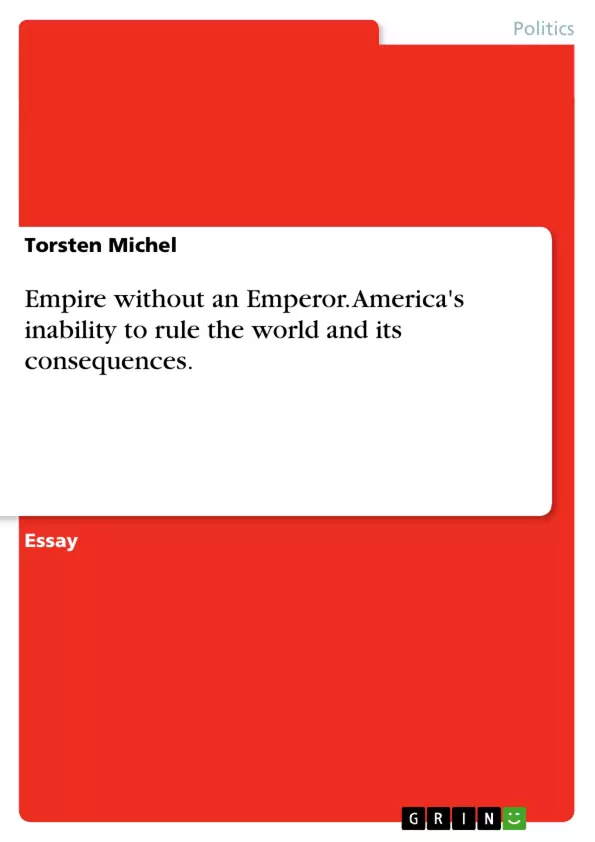The last 15 years, the period after the surprising and precipitous decline of the Soviet Union and the international structure of bipolarity saw another discussion of the future development of the international system. Some predicted that an ever declining America will be balanced by aspiring middle sized powers or new alliances; others foresaw a peaceful future in an America-dominated unipolar system due to the vast gap in the capabilities of the US and its closest pursuers. Whatever stand one made, one question remained and still remains central to an assessment of the future development of the international system: the role of the United States of America.
Inhaltsverzeichnis (Table of Contents)
- Section 1 - Empire defined
- Section 2 - The quest for and the indispensability of order - Is there an empire?
- Section 3 - Mastering globalisation – the case for an “American” empire
- Section 4 - Who wants to be an emperor? – When the will to power meets reality
Zielsetzung und Themenschwerpunkte (Objectives and Key Themes)
This essay explores the concept of empire in the context of the contemporary international system, particularly focusing on the role of the United States. The essay examines the various types of empires, the need for order in an imperial system, and the question of whether the United States is truly an "emperor" or merely part of a larger imperial structure.
- Defining and classifying empires
- The role of order in imperial structures
- The question of an "American" empire
- The relationship between imperial agent and structure
- The future of the international system
Zusammenfassung der Kapitel (Chapter Summaries)
- Section 1 - Empire defined: This section defines the term "empire" by examining four different forms of dominion: formal empire, informal empire, suzerainty, and hegemony. It emphasizes the distinction between form and reality in the exercise of imperial power, drawing on Michael Doyle's framework.
- Section 2 - The quest for and the indispensability of order - Is there an empire?: This section argues that the defining characteristic of an empire is not just control, but the establishment of a specific kind of order. This order involves both a physical and a metaphysical dimension, encompassing spatial organization and a set of dominant norms and values.
Schlüsselwörter (Keywords)
This essay focuses on the concept of empire, exploring the characteristics, types, and consequences of imperial structures in the international system. It specifically examines the role of the United States and the question of whether it constitutes an "American empire" or merely operates within a larger imperial framework. Key concepts include formal and informal empire, suzerainty, hegemony, order, and the agent-structure relationship.
Frequently Asked Questions
How is "empire" defined in contemporary international relations?
The term can be classified into four forms: formal empire, informal empire, suzerainty, and hegemony. It describes a system of dominion where one central power exercises significant control over other political entities.
Is the United States considered an empire?
The essay explores this complex question, examining whether the U.S. acts as an imperial agent or if it simply maintains a unipolar system based on its vast capabilities compared to other nations.
What is the role of "order" in an imperial system?
An empire is defined by the establishment of a specific order, which includes both physical spatial organization and a metaphysical dimension consisting of dominant norms and values.
What is the difference between hegemony and suzerainty?
Hegemony refers to leadership or dominance by one state over others through influence, whereas suzerainty involves a more formal relationship where a region has internal autonomy but its foreign policy is controlled by a more powerful state.
How did the decline of the Soviet Union affect the international structure?
The decline of the Soviet Union ended the bipolar international structure, leading to a debate about whether the system would become unipolar (dominated by the U.S.) or if new powers would balance the system.
- Quote paper
- Torsten Michel (Author), 2004, Empire without an Emperor. America's inability to rule the world and its consequences., Munich, GRIN Verlag, https://www.grin.com/document/25720



